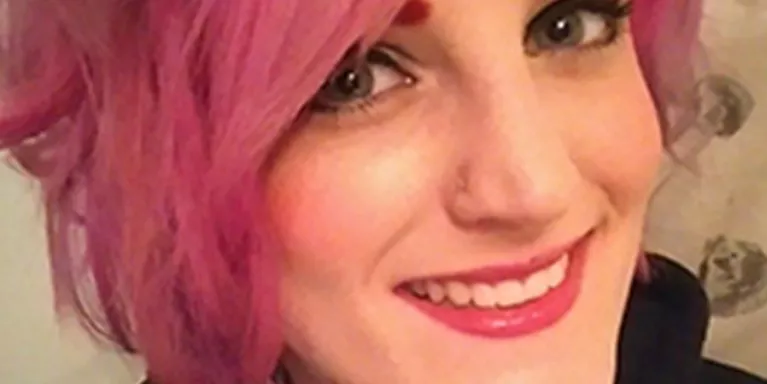Why I'm supporting 27 27
Alexis tells us how exercise has helped with her mental wellbeing, and why she's supporting our 27 27 student running challenge.
I have schizoaffective disorder and was diagnosed with the condition in my third year of University. My diagnosis rattled a cage that was already overwhelmed with a monumental number of deadlines and a 12,000-word dissertation looming in the distance.
During this time, I found that being active helped me. I hadn’t exercised until my best friends dragged me to a boot camp class, which I resented at first, but afterwards loved, as I felt a little less down (though not completely). I had done something with my day and something positive for my health and mental health.
"For me (exercising is) a form of mindfulness and a break for my brain"
Exercising is one of the five ways to wellbeing, and for me, with schizoaffective disorder, it enables me to give my mind a rest while I push myself physically and concentrate on something else. For me it’s a form of mindfulness and a break for my brain. I didn’t believe exercise could positively impact me to the level it does when I am down, but I now vouch for it and would encourage everyone who can to exercise to improve their mental wellbeing.
After university I started to run regularly, and I wish I had throughout those three years, especially in third year with all the exams and essay stress. The Mind 27/27 campaign aims to encourage young students to be active and improve their physical health and in turn their mental health. It’s something that I have found helps me when I’m overwhelmed with work and life. Speaking to my friends and family, those who exercise all say it has also had a positive impact on their mental health. Exercising releases endorphins, often known as the ‘happiness’ hormones because they lift your mood.
"You cannot just ‘cheer up,’ ‘pull yourself together,’ ‘stop crying’ or feeling the way you do"
Not many people are open and speak about being diagnosed with conditions like schizoaffective disorder, schizophrenia or psychosis. That said, most people are beginning to understand depression and anxiety more, which is a massive step in the right direction. However, our work is not done as you cannot just ‘cheer up,’ ‘pull yourself together,’ ‘stop crying’ or feeling the way you do. In my eyes there is a difference between saying I am schizoaffective and that I have it. I do not let my illness define me - I am simply a person who suffers from schizoaffective disorder.
I don’t think many people understand the daily or weekly struggles and turns a person with schizoaffective disorder can experience. The only way I can explain it is if you imagine someone’s voice who you know well, for example a friend, and your brain makes it seem like they’re talking to you. Sometimes they might say nice things to you, sometimes horrible things, but you know they aren’t there and it isn’t real. That is what living with schizoaffective disorder is like for me, and I want everyone to understand the condition so they can fight the stigma that surrounds these types of mental health problems.
I have been in hospital and struggled for many years, however, for me I don’t see this as a bad thing. It has shaped me as a person, giving me insight into my own brain and mental state as well as allowing me to be more understanding of other people. Many think that because someone is diagnosed with schizoaffective disorder they will not be able to lead a so-called ‘normal’ life, which is not true at all. I live a fulfilling life: I graduated from University, have a full-time job and am able to manage my illness.
Being mentally unwell can affect anyone, no matter how good everything might appear on the surface. You do not know what is going on in someone’s life and you should never judge anyone. How would you like it if you were the one being judged for your race, colour, religion, clothes, grades, family, friends or your mental health?
"If you’re struggling at uni, remember you are not alone and things will get better"
I believe that we need to combat the stigma surrounding mental health, and that young people need to be educated on mental health problems so that they can recognise the symptoms of being unwell in their friends, families and themselves.
University is overwhelming for most students, many suffering from anxiety and low mood over the stress of deadlines. It’s not easy, and if I could’ve given the younger me some advice it would’ve helped me a lot. If you’re struggling at uni, remember you are not alone and things will get better. Everyone has mental health and whether you have a diagnosed condition or are feeling under the weather, things will get better. It’s important to be open about your struggles and speak to your friends, family, lecturers, and whoever else helps you see light at the end of the tunnel. This might include your GP, counsellors or mental health teams.
I want people to think of my story as one that empowers anyone who is struggling. In the same way we have physical health we also have mental health, and it is important to share your experiences and not keep things in.

Take part in 27 27
This March, run 27 miles in 27 days in solidarity with the 27% of us that report mental health problems at university.
Share your story with others
Blogs and stories can show that people with mental health problems are cared about, understood and listened to. We can use it to challenge the status quo and change attitudes.
















